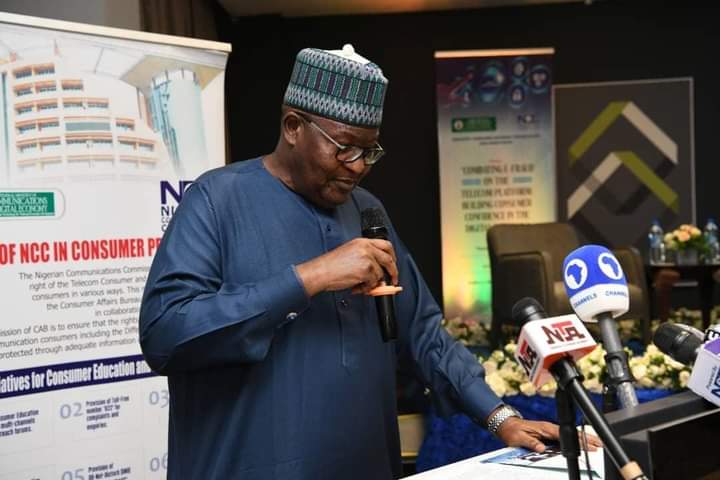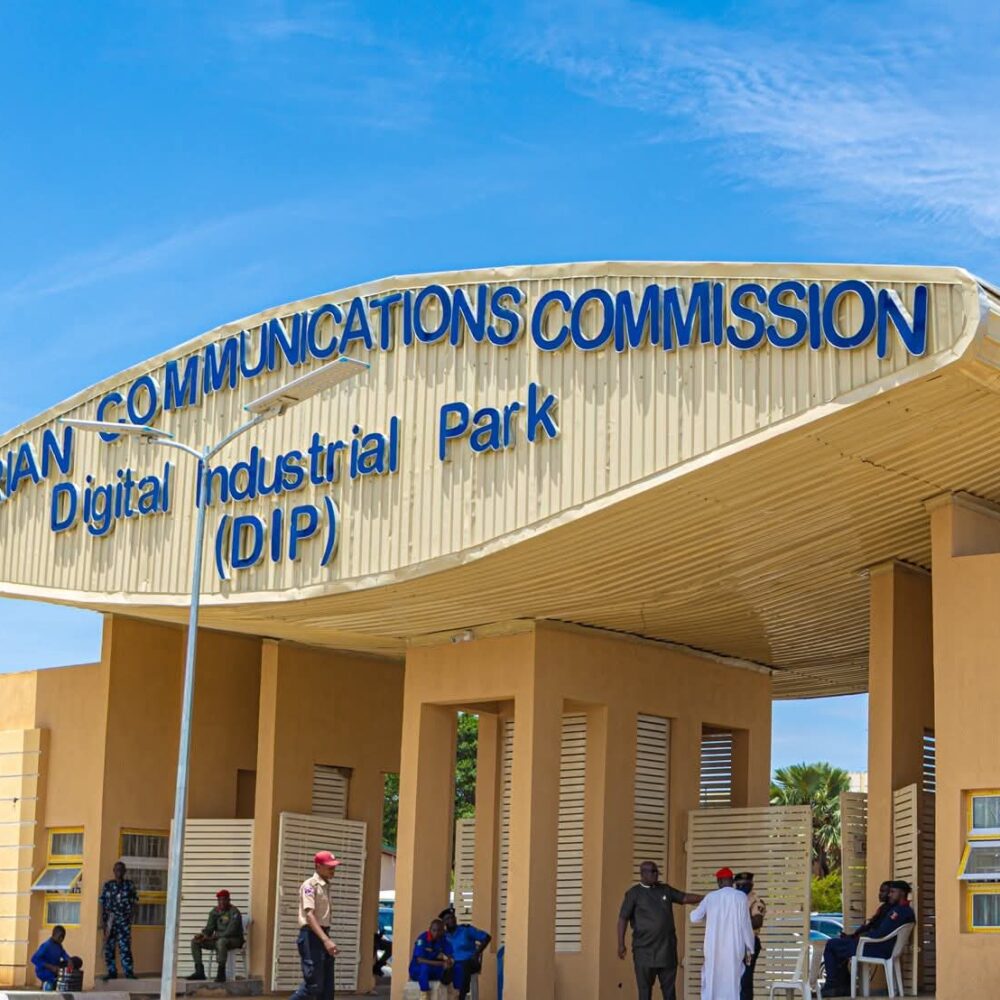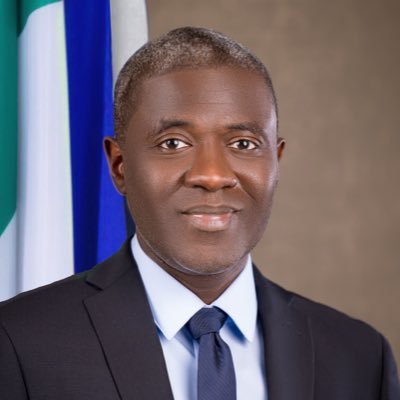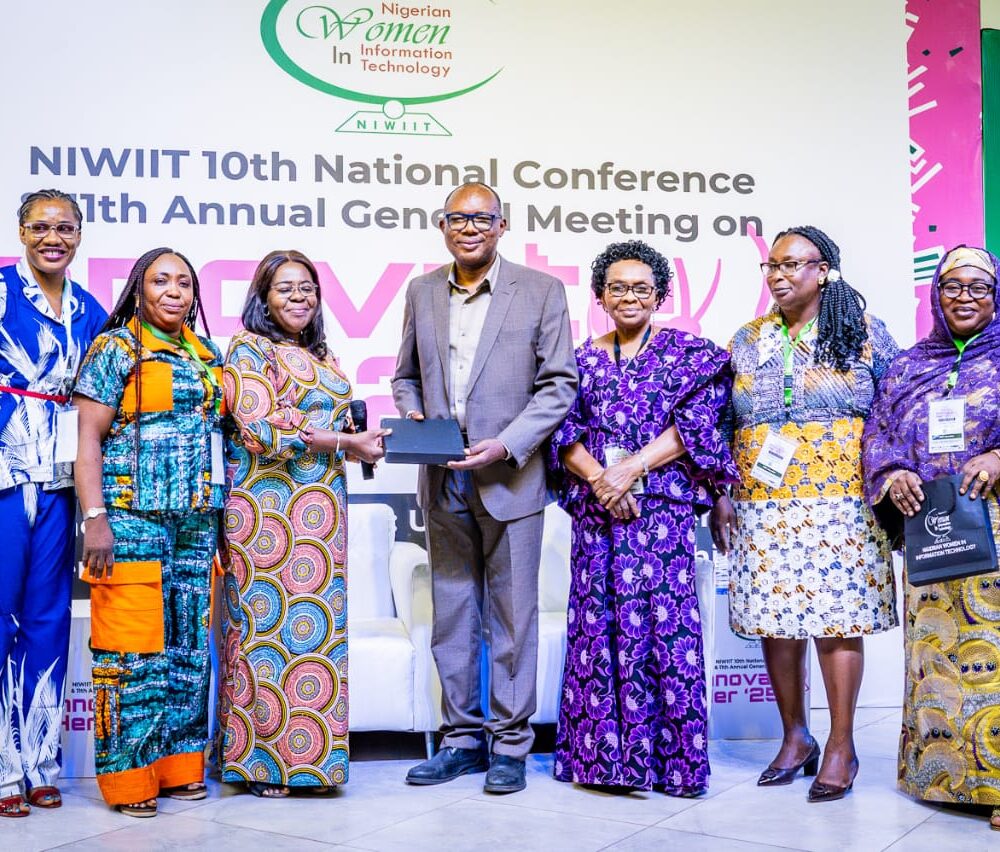Executive Vice Chairman/CEO,
Nigerian Communications Commission, NCC,Prof.Umar Garba Danbatta has called on relevant stakeholders in the Telecommunication sector to collectively address the growing concern of fraudulent activities in the digital realm and take proactive measures to safeguard the trust and confidence of consumers.
Prof Umar Danbatta stated this in his keynote address at 2nd Quarter 2023 Industry Consumer Advisory Forum (ICAF) Meeting also known as Open Forum held in Lagos during the weekend,with the theme; “Combating e-fraud on telecom platforms and building consumer confidence in the digital economy”


He said as Telecom Sector navigate the ever-evolving landscape of technology,Digital technology offered Nigeria the opportunity to grow and diversify its economy from the overdependence on agriculture or oil and gas export proceeds.
Prof Danbatta address read in part:
“The launch of the Nigerian National Broadband Plan 2020 – 2025 as well as the National Digital Economy Policy and Strategy 2020 – 2030 (NDEPS) attests to the fact that Nigeria is poised to join the comity of nations and become a global leader in transforming its economy into a digital one.
“In recent years, Nigeria has witnessed remarkable growth in the digital economy, revolutionizing the way we communicate, transact, and conduct business. The telecom sector plays a pivotal role in enabling this digital transformation, providing the infrastructure and connectivity that fuel our interconnected world. However, with these advancements come new challenges, one of which is the rising tide of e-fraud and cybersecurity concerns.
“E-fraud encompasses a wide range of malicious activities carried out via electronic means, including identity theft, phishing, hacking, and unauthorized access to personal and financial information, with the intention to defraud or take advantage of victims. These criminal activities may not only cause significant financial losses but also erode consumer trust in the digital ecosystem.
“The NCC as the regulator of the communications sector has a crucial role to play in combatting e-fraud. We must establish comprehensive legal frameworks and standards that mandate sound security practices for telecom operators.
“The legal framework must focus on data protection, privacy and incident response, ensuring that operators are held accountable for any lapses in security on their respective networks. The NCC also type-approves communications equipment to ensure that they conform to global standards and are interoperable with various relevant technologies. In this regard, The Commission collaborates with Mobile Network Operators to ensure the safety of their networks and conducts regular audits and assessments to verify compliance and encourage a culture of cybersecurity within the industry.
In accordance with the Nigerian Communications Act 2003, telecom operators have a responsibility to ensure the security and integrity of their networks and to prevent it from being used in, or in relation to, the commission of any offence under any law in operation in Nigeria. With the increasing uptake of digital financial services and the advent of disruptive technologies, the issue of cybersecurity has become increasingly important.
“Telecom operators must therefore invest in robust infrastructure, employ state-of-the-art security measures, and conduct regular audits to identify vulnerabilities and address them promptly. Additionally, operators should implement stringent authentication protocols, two-factor authentication, and encryption mechanisms to safeguard customer data and prevent unauthorized access.
“There is also the concern about how personal data is collected, stored, shared and exploited. Fortunately, NDEPS 2020-2030 adequately addresses the protection of telecom consumers against the threats of cybercrime, encouraging them to embrace digital finance and supporting them to contribute to the Digital Economy. Pillar #6 of the NDEPS, which deals with soft infrastructure, has proven to be proactive. The soft infrastructure pillar focuses on strengthening public confidence in the use of digital technologies and participation in the Digital Economy. The pillar will address the importance of cybersecurity and other standards, frameworks, and guidelines that encourage citizens to embrace a digital culture. Data privacy and the deployment of technologies like the public key infrastructure are addressed in this pillar.
“Recently, the Nigeria Data Protection Act 2023 was signed into law to provide a legal framework for the protection of personal information and the regulation of how personal information is processed, among other things. The NCC is also in the process of developing more elaborate Data Protection Regulations to ensure the protection and privacy of data in the Nigerian communications sector. It is important to mention that the Commission has issued the Consumer Code of Practice Regulations 2007 which among other things, provides for the protection of consumer information.
“Law Enforcement Agencies must also collaborate closely with telecom operators and regulatory bodies to investigate and prosecute e-fraud perpetrators. Enhanced coordination, information sharing, and dedicated cybercrime units can go a long way in deterring criminals and bringing them to justice. Strengthening international cooperation in combating cross-border e-fraud is also imperative, as cybercriminals often exploit jurisdictional limitations.
“The Commission, committed to fulfilling its mandate and passionate about driving Digital Economy in Nigeria, has continued to implement initiatives to Protect, Inform and Educate telecom consumers in this regard. Through its Consumer Affairs Bureau (CAB), the Commission undertakes constant Consumer Education with a significant part of this effort dedicated to providing information that equips the Consumer to thrive in a world that has embraced digital finance. Information dissemination materials on how to safeguard themselves while using telecom platforms to access digital financial products are available on the NCC consumer portal whilst hardcopies are distributed at consumer outreach events.
To further protect telecom consumers, the Nigerian Communications Commission’s Computer Security Incident Response Team (NCC-CSIRT) periodically notifies telecom consumers of the latest cybersecurity threats and how to avoid falling victim to them. NCC-CSIRT in collaboration with the Nigeria Computer Emergency Response Team (ngCERT) at the office of the National Security Adviser has been at the forefront of protecting telecom consumers from cyber threats. The provision of timely advisories has helped to protect consumers from being unfairly targeted by cyber-attacks, which goes a long way in ensuring that they can access digital services without suffering unwarranted losses. We strongly believe that by fostering a culture of vigilance and knowledge, we can collectively reduce the success rate of e-fraud attempts.
“However, combatting e-fraud is not just the responsibility of industry stakeholders and authorities. Consumers too, must be active participants in this battle against e-fraud. Building consumer awareness and promoting digital literacy is crucial to empowering individuals to protect themselves. Telecom operators should educate their customers about potential risks, provide guidance on secure online practices, and offer user-friendly tools to monitor and manage their accounts. Regular communication with customers, promptly addressing their concerns, and providing timely updates on security issues are vital in establishing trust. To build consumer confidence in the Digital Economy, we must emphasize transparency and accountability. Telecom operators should be transparent about their security measures, privacy policies, and incident response mechanisms. Collaboration with third-party security firms and independent audits can also help validate the integrity of telecom platforms.
“Furthermore, fostering innovation in security technologies is critical to staying ahead of e-fraudsters. Advancements in artificial intelligence, machine learning and data analytics can enable the detection of anomalous behaviors, identify potential threats, and respond swiftly to emerging fraud trends. Collaboration between academia, industry, and research institutions can drive innovation in cybersecurity and produce effective countermeasures against e-fraud.
In conclusion, combatting e-fraud on telecom platforms and building consumer confidence in the digital economy requires a collective effort. Telecom operators, regulatory bodies, law enforcement agencies, and consumers must collaborate, each fulfilling their respective responsibilities. By investing in robust security infrastructure, implementing stringent protocols, promoting awareness, and fostering innovation, we can create a safer digital ecosystem that inspires trust and enables the full potential of the digital economy.
‘Together, let us rise to the challenge and build a future where the telecom platform is not only a gateway to the digital world but also a fortress against e-fraud”.
In his remarks,the ICAF Chairman,Mazi Akpa E. Emeka maintained that evolution of E-fraud threats has undermined the effectiveness of a reactive approach to combating fraud, which essentially focused on stopping schemes one by one through manual reviews.
He said;”The 2023 2nd quarter open forum of the Industry Consumer Advisory Forum (ICAF) decided to bring this issue to bear as it affects consumers a great deal. In this edition, we intend to propose a new approach on Combatting E-Fraud on the Telecommunication Platforms and ways of Building Consumer Confidence in the Digital Economy and we believe with the retinue of experts here present, we intend to achieve this goal using the current realities of this time to strengthen the core capabilities and improve our abilities to continually identify and address vulnerabilities arising from new fraud methods and patterns”.
Also in his welcome address,NCC Director, Consumer Affairs Bureau,Alh.Alkasim Abubakar Umar highlighted measures to be adopted in tackling E-Fraud on Telecommunication platforms ,build consumer’s confidence in digital economy.
Alh.Alkasim Abubakar Umar said E- fraud remain a pressing issue that affected not only the telecommunications industry but also the overall safety and security of the nation’s digital landscape.
He added that in recent years, the growth of the telecommunications sector in Nigeria has been remarkable. With increasing access to mobile phones and internet connectivity.
“We have witnessed a surge in digital transactions, making our lives more convenient and efficient. However, this rapid expansion has also opened new avenues for criminals to exploit unsuspecting individuals through various forms of electronic fraud. According to some reports, Nigerians have lost about N12.5 billion to financial crimes linked to the telecommunications industry in the past four (4) years.
“The Center for Strategic and International Studies (CSIS) estimated that 600 billion US Dollars is lost to cybercrime each year, an increase from a 2014 study that put global losses at about 445 billion US Dollars.
“In Africa, the peril of cybercrimes recorded a massive rise in the first six months of 2022, “with phishing and scams hitting 438 percent and 174 percent in Kenya and Nigeria, respectively”, the Guardian Newspapers. reported on August 3, 2022.
“E-fraud poses a significant threat to our society, as it undermines the trust and confidence in our digital platforms, hampers economic growth, and adversely impacts the lives of our citizens. As the regulatory authority responsible for overseeing the telecommunications industry, the NCC recognizes its duty to safeguard the interests of consumers and protect the integrity of our digital ecosystem”.Alhaji Umar stated.
Umar added that the ICAF provided an opportunity for the both Telecom operators and consumers to come together as stakeholders, including, financial institutions, law enforcement agencies, government bodies, and concerned citizens, to collaborate and devise effective strategies to combat e-fraud.
He said NCC remained committed to its mandate of creating an enabling environment for the sustainable growth of the telecommunications sector.
“To this end, we have already implemented several initiatives aimed at mitigating e-fraud risks. However, we understand that the battle against e-fraud requires constant adaptation and continuous improvement. Hence, this forum serves as a platform to share best practices, exchange knowledge, and explore innovative solutions to stay ahead of the ever-evolving tactics employed by fraudsters.
“I encourage all participants to actively engage in discussions, share their experiences, and propose practical recommendations. Let us leverage the collective expertise in this room to develop strategies that strike a balance between convenience and security, ensuring that our telecom platforms remain safe and trustworthy.
“Moreover, I urge all stakeholders to prioritize consumer education and awareness. By equipping individuals with the necessary knowledge and skills to identify and report e-fraud, we can empower them to protect themselves and contribute to the broader fight against cybercrime.
Alhaji Umar described Consumer as one of the major stakeholders in the telecoms industry.
“It is our desire as a Commission to ensure that they enjoy primary focus. We believe that through adequate education, information sharing, and the provision of an array of channels for redress, we can safeguard telecom consumers, and innovatively promote the prospect for greater Consumer Experience in the Digital Economy.
“Together, we can build a culture of digital literacy and resilience that safeguards our nation’s digital future.
In closing, I would like to express my sincere gratitude to all the participants, speakers, and organizers who have made this forum possible.
“Your dedication and commitment to addressing e-fraud in the telecom sector are commendable. Let us seize this opportunity to forge stronger partnerships and develop practical solutions that will enable us to overcome this challenge” Alh.Umar added.





